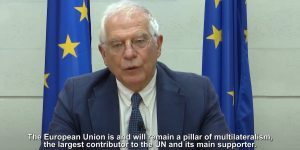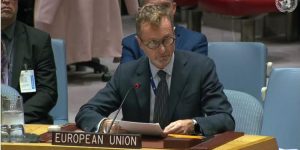7 November 2017, New York
Mr. President,
I have the honor to speak on behalf of the European Union and its 28 Member States. The Candidate Countries Turkey, the former Yugoslav Republic of Macedonia*, Montenegro* and Albania*, as well as Ukraine, align themselves with this statement.
We thank the Security Council for unanimously adopting the respective resolution renewing the mandate of EUFOR Althea in Bosnia and Herzegovina for one year. I join other speakers in welcoming High Representative Valentin Inzko back to the Council and in assuring him of the European Union’s continued support. I also welcome the Permanent Representative of Bosnia and Herzegovina and thank him for his statement.
Mr. President,
2016 was an important year for the EU perspective of Bosnia and Herzegovina. Following the submission of the membership application by Bosnia and Herzegovina, the EU Council decided to ask the Commission’s Opinion regarding the membership application.
This decision followed the commitment and readiness by Bosnia and Herzegovina to take difficult political decisions in order to deliver on the country’s EU integration path, including ensuring further meaningful progress in the implementation of the Reform Agenda, an ambitious set of socio-economic, rule of law and public administration reforms.
Together with our international partners, including the international financial institutions, we provided clear incentives to move forward with the necessary reforms aimed at progressively tackling the structural challenges that hold back the country’s development.
2017 was thus expected to be marked by a continuous momentum in the reform process.
However, a year later, the EU regrets that divisive rhetoric rooted in the past and an early preoccupation with upcoming elections have, for most of 2017, slowed down the pace of reforms and affected the political climate.
The authorities in Bosnia and Herzegovina at all levels of governance, including in both of the country’s entities, need to translate commitments into concrete reforms in order to move the country forward on its EU integration path.
The initial implementation of the Reform Agenda has provided the first steps of structural adjustments to the economy of Bosnia and Herzegovina but much remains to be done. Delays in the signature of the Transport Community Treaty – belatedly signed last September – and continuing uncertainty around the adoption of excise legislation, to name only two issues, have undermined the possibility for the Country to receive further international financial assistance
Still a year away from the general elections, the European Union continues to urge the authorities to step up the implementation of comprehensive reforms, in an inclusive manner, to the benefit of all citizens. Additionally, the European Union calls on the institutions of Bosnia and Herzegovina to step up efforts regarding the functioning and the independence of the judiciary, the fight against corruption and organised crime as well as the fight against terrorism and the prevention of radicalisation.
Political authorities ought in this respect to refrain from undermining the judiciary of Bosnia and Herzegovina and from commenting on sensitive judicial proceedings, for electoral purposes. It is their responsibility to create a dispassionate environment where the judiciary can adjudicate effectively and independently.
In turn, the highest judicial authorities of the country have to uphold appropriate standards of integrity and independence.
The EU also reiterates our calls on all levels of governance in Bosnia and Herzegovina to ensure the effectiveness of the coordination mechanism, including for the purpose of ensuring harmonised and consolidated answers to the Commission’s Opinion Questionnaire. In this respect, Bosnia and Herzegovina needs to continue the work done to answer the Questionnaire.
Mr. President,
As mentioned, the general elections are 12 months away. Whilst acknowledging that the Constitution of Bosnia and Herzegovina lists Bosniaks, Croats and Serbs as constituent peoples (along with Others), the European Union reiterates that the principles of equality of all citizens and non-discrimination shall be fully warranted. The European Union underlines that no legislative or political steps should be taken which would make the implementation of the Sejdić-Finci ruling and related rulings more challenging.
In addition to the outstanding OSCE-ODIHR recommendations to further improve the electoral framework, the European Union expects Bosnia and Herzegovina to address, within the necessary deadlines, the December 2016 ruling by the Constitutional Court of Bosnia and Herzegovina concerning specific electoral provisions on the Federation House of Peoples.
The European Union considers that electoral reforms should be approached in a spirit of consensus and dialogue, as an important matter, thereby also calling on Bosnia and Herzegovina to implement OSCE-ODHIR recommendations in order to move the country towards European standards, improving democratic processes for future elections.
Mr. President,
The European Union reiterates its unequivocal commitment to the territorial integrity of Bosnia and Herzegovina as a single, united and sovereign country. The European Union will continue to use all available instruments to support Bosnia and Herzegovina’s stability and progress. While the overall security situation has remained relatively calm and stable, stability has not been fully entrenched. The European Union welcomes the continued presence of Operation Althea, which retains the capability to contribute to the Bosnia and Herzegovina authorities’ deterrence capacity if the situation so requires. In this regard, as part of the overall EU strategy for Bosnia and Herzegovina, the European Union confirms its readiness to continue at this stage the executive military role of Operation Althea to support Bosnia and Herzegovina’s authorities to maintain the safe and secure environment, under a renewed UN mandate.
The European Union has invited the High Representative for Foreign Affairs and Security Policy to present a Strategic Review before the end of the year, as a basis for internal discussion within the EU on options for the future of the Operation, also bearing in mind Bosnia and Herzegovina’s progress in its EU integration process and taking into account the security situation on the ground.
As the country’s stability continues to strengthen and further progress is achieved in reforms and on the EU path, the European Union looks forward to continuing, in the appropriate forum, the discussion with the international community on the possible reconfiguration of the international presence. In this regard, the European Union calls on the authorities in Bosnia and Herzegovina to pursue the Reform Agenda and to increase its efforts to meet the outstanding objectives and the conditions for the future closure of the Office of the High Representative.
Bosnia and Hercegovina is aiming to advance on its Euroatlantic integration, and hopefully all obstacles will soon be removed in this regard which would be an important development for the stability and security of the entire region.
Mr. President, in conclusion,
Over the two decades that the Council has been discussing the situation in Bosnia and Herzegovina, we have witnessed substantial progress in the country in all fields – stability, democracy, security, economic development, EU integration.
However, the significant emigration that continues to affect the country and undermines its future is a reminder that citizens demand more changes to improve their daily lives. While it is important to concentrate on the future, we urge the authorities of Bosnia and Herzegovina also to actively promote reconciliation.
The EU integration process offers an avenue for tackling the deep rooted structural challenges affecting Bosnia and Herzegovina but it is for its political leadership to engage with this process and to deliver on the necessary reforms.
Thank you, Mr. President.
* The former Yugoslav Republic of Macedonia, Montenegro and Albania continue to be part of the Stabilisation and Association Process.
* The former Yugoslav Republic of Macedonia, Montenegro and Serbia continue to be part of the Stabilisation and Association Process.



